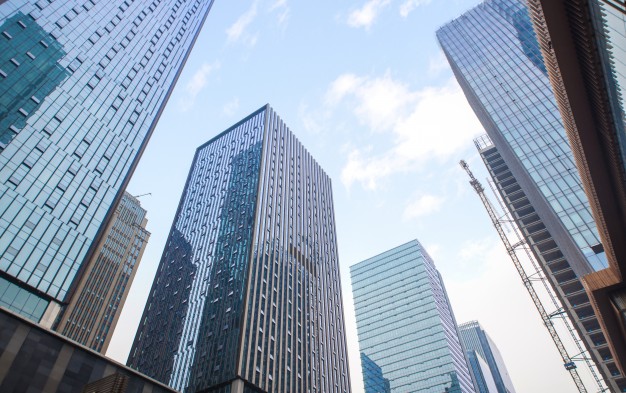Finding commercial office building insurance can be difficult in today’s hardening insurance market. Every commercial underwriter will want to assess specific factors as he or she reviews building insurance applications. What are the factors commercial insurance underwriters use to evaluate commercial office coverage? First, let’s discuss what commercial underwriters look for as they evaluate office buildings.
What Kinds of Hazards Do Insurers Look for in Office Building Exposures?
With higher-value buildings, often over $250,000, or for buildings older than 30 years, many insurers will inspect the property prior to extending coverage. During the assessment, the inspector reviews the building’s updates. For example, electrical upgrades, the fire protection in place and adjacent properties to determine any potential impact on your building. As the commercial building owner, you should comply with any recommendations the inspector makes to avoid rejection or cancellation. The inspector will focus on a few areas during the site visit.
- Construction – What material was used to construct the building? Here are the different construction classes that categorize your building.
-
- Class 1 — Frame
- Class 2 — Joisted Masonry
- Class 3 — Noncombustible
- Class 4 — Masonry Noncombustible
- Class 5 — Modified Fire Resistive
- Class 6 — Fire Resistive
- Fire protection – The inspector will review both public and private fire protection. Public protection includes how close your building is to a fire department. The inspector will analyze the water supply and the area’s emergency response using national standards. Private fire protection includes your on-site fire mitigation efforts, including fire extinguishers and sprinkler systems. If there are restaurants in your building, Ansul fire suppression systems that are properly maintained help to improve the insurability of the account.
- Maintenance and upkeep – Are the buildings clean, well-lit and in overall good condition?
- Location – Is your building exposed to wildfire risk or are you located in a tornado alley? Additionally, a building located near a building with a hazardous exposure may have more trouble obtaining insurance than one located near a less dangerous building.
- Liability exposures – Does your business have on-premises security? Are your handrails and stairs in good shape? Are you located in a high-crime area where visitors may encounter higher than normal risks as they enter and exit the building?
- Insurance to value – Insurers want to be sure that you correctly value your building for insurance replacement cost in the event of loss. According to one commercial insurance inspection company, 75% of buildings today are underinsured. To review the importance of insurance to value, read our article.
What Does Commercial Office Building Insurance Cover?
Commercial office property insurance provides coverage for the building, its business office equipment, fencing, signs, structures on your property, such as a storage building, and more.
Here are three property policy forms offered by most insurers for your building property coverage.
- Basic Form – The basic form covers most natural disasters (except flood). It also covers smoke, vandalism and theft.
- Broad Form – The broad form provides coverage beyond the basic form. It protects against damage from the weight of ice and snow, water damage, protection from falling objects and some structural collapses.
- Special Form – The special form is the most comprehensive coverage and covers most losses not specifically excluded. Always consider this form because its cost is not that much higher than the other two forms.
What Does My Building Liability Insurance Cover?
Liability insurance within building insurance protects the owner against injuries and property damage occurring on the premises, for example, the halls, parking lot and elevators. Your tenants may have clients or vendors visiting their offices, so they will need separate liability insurance. Tenants’ liability coverage protects the tenant for liability arising out of the portion of your building they occupy. While your leases should contain hold harmless language that protects the building owner or manager, building owners usually request additional insured status under their tenants’ general liability coverage, as well.
Today’s insurance agents normally recommend you buy hired and non-owned auto coverage if you do not have commercial auto insurance. All business owners have this exposure if they rent vehicles or ask their employees to run errands for them using the employee’s own vehicle. Your employee’s auto coverage would be the primary target in the event of an accident. However, insufficient liability limits on your employee’s vehicle exposes your business to non-owned auto liability.
What Optional Commercial Office Building Insurance Coverages Can I Request?
In addition to the standard property and liability coverages, you can also request a quote for these additional coverages.
- Equipment breakdown, especially important in commercial office building insurance
- The cost of ordinance or law upgrades to your building that would arise after a loss
- Additional sign coverage
- Coverage for backup of sewer or water
- Employee dishonesty coverages, an important coverage for today’s commercial business owner
- Coverage for wind-driven rain
A thorough discussion about your loss history, the types of businesses located in your building and a walk-through of your property with photos, can help tailor the best policy for you. We’re happy to discuss your office insurance requirements with you.
What Applications Must the Owner Complete for an Office Building Insurance Quote?
Each insurance company may require slightly different applications, but the most common is the Acord form, a standard property form designed to provide consistent information to carriers underwriting property insurance. For the liability portion, insurers usually request the Acord commercial general liability form. Your agent will furnish and review the necessary forms as you complete them.
Managing the exposures surrounding large commercial buildings can be complicated. Your insurance policy is a critical cornerstone of your risk management strategy. Carefully tailored commercial office building insurance can help ensure that if a loss occurs, you have the most effective coverage to respond.
Contact us at this link for a quote on your commercial office building insurance.


